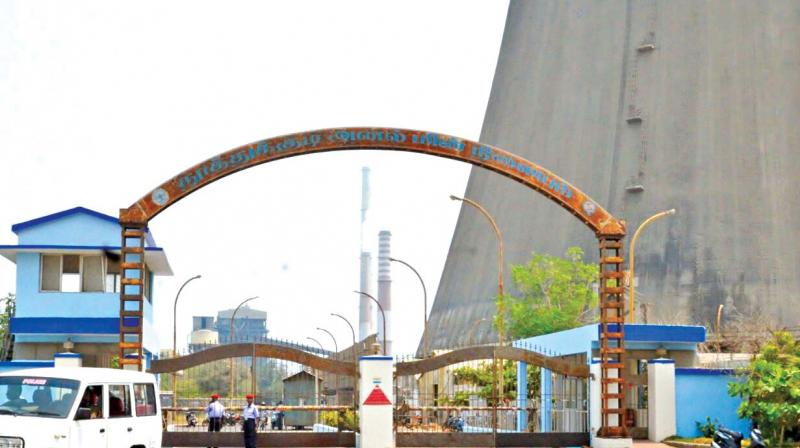Thoothukudi no longer promising power generation hub of South India
Protesting environmental groups, fishers hamper progress.

Thoothukudi: Thoothukudi district proudly projected to be an emerging power generation hub of South India has, however, lost its sheen recently due to the Tamil Nadu government’s inconsistent power policy. The continuing stir by environmental groups has added fuel to the issue.
Projected to receive a massive investment to the tune of Rs 42,000 crore to enhance the power generation capacity to around 8,000 MWe by 2020, Thoothukudi district was seen as a much desired destination for investments in the power sector.
The district having a total power generation capacity of around 4,064 MWe just two years ago, lost half of it by the closure of four coal fired power projects since 2016. Only two government run powerplants—the Tuticorin Thermal Power Station (TTPS) (5x210 MWe) and the 2x500 MWe NTPL— a joint venture project of Tangedco and NLC are under operation in Thoothukudi district now, according to a senior engineer at TTPS.
The private coal fired plant run by Ind-Barath Power Infra Limited (IBPIL) that run two power plants—-3x150 MWe (450 MWe) and 3x68 MWe (204MWe) closed down its plants due to debt crisis. “The power plants reportedly owed a debt of '1,021.11 crore to the consortium of 18 banks and is said to have not yet paid '700 crore by the state government for the power purchased.”
Similarly, another power plant, run by Coastal Energen Limited, having a total generation capacity of 2x600 MWe in the district too has suspended its power generation as the government was said to have owed dues of around '500 crore. The recent inclusion in the list of closure is the 2x80 MWe thermal power plant run by Sterlite copper in the district.
The major reason apart from objections from environmentalists, however, is the lack of a consistent policy of the state government. The sudden cancellation of the Power Purchase agreements (PPAs) of the state government was complained to have almost doomed the power projects run by IBPIL and the coastal Energen limited.
Moreover, the lack of fuel supply agreement and dependency of the power generators on inconsistent coal price too have pushed the power plants to resort to the extreme step of lock out that resulted in a huge job loss.
According to Murugan of CITU around 3,000 men working with the IBPIL and Coastal Energen limited were rendered jobless since 2016 in the district.
Even the projects proposed by big groups like the Reliance with a installation capacity of 1,000 MWe has been delayed. “The project proposed to be launched at Veppalodai in Thoothukudi district bordering Ramanathapuram, however, has been already issued licence,” said a Tangedco official, who added that the ‘Spic Electric Power Corporation (SEPC)’ that has been issued clearance for a 525 MWe project nine years ago is still under construction. Not only the private projects but also the state proposed thermal power projects in the district progress in snail’s pace, said the Tamgedco official.
The 2x650 super critical thermal power project at Udangudi in the district has been facing stiff opposition from the coastal community. The fishermen and environmentalist object to the construction of a dedicated coal jetty to ensure easy supply of coal to the Udangidu project.
Recently the fishermen also objected to a survey ship involved in oceanographic study to set up a coal jetty at Kallamoli village near Manapad.
Another 800 MWe government power project under construction at Veppalodai in Thoothukudi district is also said to be not progressing in the expected pace, due to fishermen’s agitations.
Moreover, the Tuticorin Thermal Power station (TTPS), one of the premier state-owned power projects in Tamil Nadu has been under operation beyond its average life span. “The first three units of TTPS were established 40 years ago in 1977 and almost all the five units have crossed their average life time of 30 years,” said a senior engineer at TTPS.
Moreover, it has been said that after 2013, all the five units of TTPS were in continuous operation for 31 days after five years during April and May of this year. “Even today (June 7) two units have been kept under suspension,” said the TTPS engineer, who added that unless the government take immediate measures to replace the worn out units of TTPS, the port-town could lose TTPS also.
The suspension of power generation by four power projects since 2016 too has had a negative impact on the total business volume of the V O C port here. According to its annual performance statement the port lost around two million tonnes of coal during 2017-2018, when compared to the previous years. The recent developments too, however, was said to be not encouraging as the
closure of industrial units due to people’s agitations is feared to affect the port’s business further in the current fiscal.

